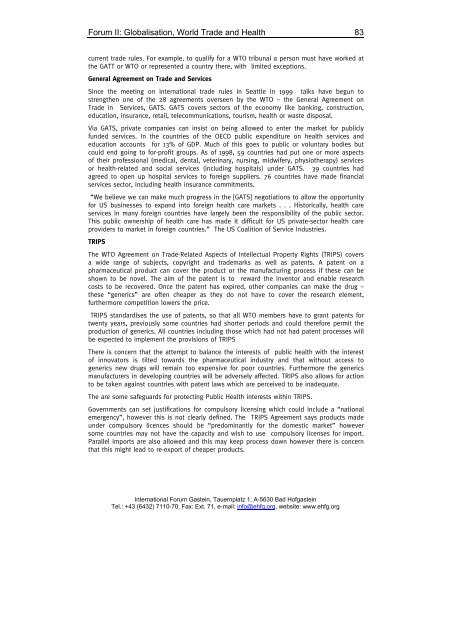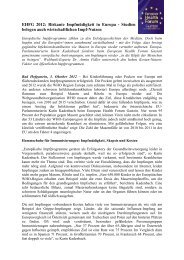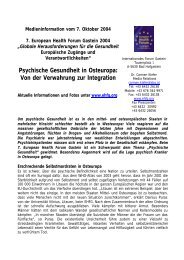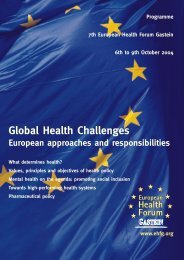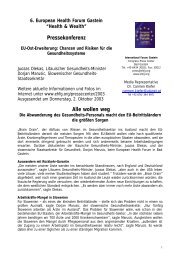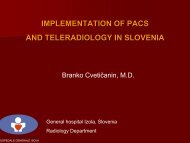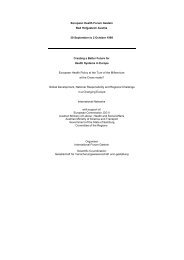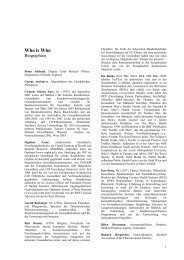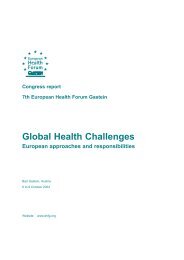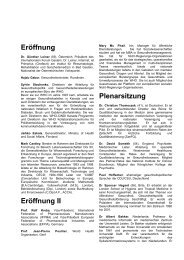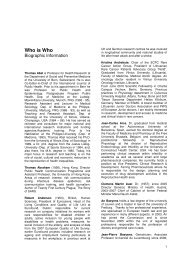Congress report - European Health Forum Gastein
Congress report - European Health Forum Gastein
Congress report - European Health Forum Gastein
You also want an ePaper? Increase the reach of your titles
YUMPU automatically turns print PDFs into web optimized ePapers that Google loves.
<strong>Forum</strong> II: Globalisation, World Trade and <strong>Health</strong><br />
current trade rules. For example, to qualify for a WTO tribunal a person must have worked at<br />
the GATT or WTO or represented a country there, with limited exceptions.<br />
General Agreement on Trade and Services<br />
Since the meeting on international trade rules in Seattle in 1999 talks have begun to<br />
strengthen one of the 28 agreements overseen by the WTO – the General Agreement on<br />
Trade in Services, GATS. GATS covers sectors of the economy like banking, construction,<br />
education, insurance, retail, telecommunications, tourism, health or waste disposal.<br />
Via GATS, private companies can insist on being allowed to enter the market for publicly<br />
funded services. In the countries of the OECD public expenditure on health services and<br />
education accounts for 13% of GDP. Much of this goes to public or voluntary bodies but<br />
could end going to for-profit groups. As of 1998, 59 countries had put one or more aspects<br />
of their professional (medical, dental, veterinary, nursing, midwifery, physiotherapy) services<br />
or health-related and social services (including hospitals) under GATS. 39 countries had<br />
agreed to open up hospital services to foreign suppliers. 76 countries have made financial<br />
services sector, including health insurance commitments.<br />
“We believe we can make much progress in the [GATS] negotiations to allow the opportunity<br />
for US businesses to expand into foreign health care markets . . . Historically, health care<br />
services in many foreign countries have largely been the responsibility of the public sector.<br />
This public ownership of health care has made it difficult for US private-sector health care<br />
providers to market in foreign countries.” The US Coalition of Service Industries.<br />
TRIPS<br />
The WTO Agreement on Trade-Related Aspects of Intellectual Property Rights (TRIPS) covers<br />
a wide range of subjects, copyright and trademarks as well as patents. A patent on a<br />
pharmaceutical product can cover the product or the manufacturing process if these can be<br />
shown to be novel. The aim of the patent is to reward the inventor and enable research<br />
costs to be recovered. Once the patent has expired, other companies can make the drug –<br />
these “generics” are often cheaper as they do not have to cover the research element,<br />
furthermore competition lowers the price.<br />
TRIPS standardises the use of patents, so that all WTO members have to grant patents for<br />
twenty years, previously some countries had shorter periods and could therefore permit the<br />
production of generics. All countries including those which had not had patent processes will<br />
be expected to implement the provisions of TRIPS<br />
There is concern that the attempt to balance the interests of public health with the interest<br />
of innovators is tilted towards the pharmaceutical industry and that without access to<br />
generics new drugs will remain too expensive for poor countries. Furthermore the generics<br />
manufacturers in developing countries will be adversely affected. TRIPS also allows for action<br />
to be taken against countries with patent laws which are perceived to be inadequate.<br />
The are some safeguards for protecting Public <strong>Health</strong> interests within TRIPS.<br />
Governments can set justifications for compulsory licensing which could include a “national<br />
emergency”, however this is not clearly defined. The TRIPS Agreement says products made<br />
under compulsory licences should be “predominantly for the domestic market” however<br />
some countries may not have the capacity and wish to use compulsory licenses for import.<br />
Parallel imports are also allowed and this may keep process down however there is concern<br />
that this might lead to re-export of cheaper products.<br />
International <strong>Forum</strong> <strong>Gastein</strong>, Tauernplatz 1, A-5630 Bad Hofgastein<br />
Tel.: +43 (6432) 7110-70, Fax: Ext. 71, e-mail: info@ehfg.org, website: www.ehfg.org<br />
83


